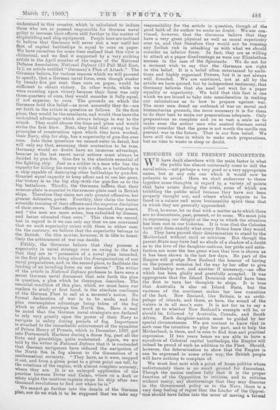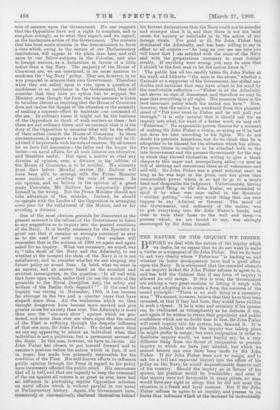THOUGHTS ON THE PRESENT DISCONTENTS.
WE have dealt elsewhere with the main factor in what the public has almost universally come to call the naval crisis,—not perhaps a very good or a very appropriate name, but at any rate one which it would now be pedantic to avoid. Here we shall endeavour to throw together some thoughts in regard to a variety , of points. that, have arisen during the crisis, some of Which are troubling the public mind because they have not been properly thought out, and others which require to be faced in a calmer and more businesslike spirit than that in which they are generally approached.
First, however, let us deal with a matter as to which there are no discontents; past, present, or .to come. We most join in expressing our delight at the way in which the situation has been mot in our Colonies. It is true that the Colonies have only done exactly what every Briton knew they would do. They have proved their determination to stand by the Motherland without cavil Or criticism. But though the parent-State may have had no shade of a shadow of a doubt as to the love of the daughter-nations, her pride and satis- faction are none the less great when that love is shown as it has been shown in the last few days. No part of the Empire will grudge New Zealand the honour of having on the present occasion led the way by her offer to give one battleship now, and another if necessary,—an offer which has been gladly and gratefully accepted. It was appropriate that the Island Dominion should have been the first to turn her thought's to ships. It is true that Australia is also an Island State, but the vastness of the continent makes her less conscious of the fact. New Zealand, like Britain, is an archi- pelago of islands, and there, as here, the sound of the waters is in all men's ears. It is not for us to say a word as to whether New Zealand's example will be, or should. be, followed by Australia, Canada, and South Africa. Each daughter-nation must be guided by her special circumstances. We are content to know that in each case the intention to play her part, and to help the Motherland, is there, and is sure to find true and practical expression. If two years hence we are able to have a squadron of Colonial capital battleships, the Empire will indeed be proud of such an addition to the Fleet. Should, however, the determination to show that the Empire is one be expressed in some other way,lhe British people will have nothing to complain of.
We must deal next with a point of home politics where unfortunately there is no small ground for discontent. Though the nation realises fully that it is the proper function of the Opposition to criticise, and to criticise without mercy, auy shortcomings that they may discover in the Government policy as to the Navy, there is a very deep feeling of regret that the Leader of the Opposi- tion should have fallen into the error of moving a formal vote of censure upon the Government. No one suggests that the Opposition have not a right to complain, and to complain strongly, as to what they regard, and we regard, as the inadequate action of the Government. The mistake that has been made consists in the determination to force a vote which, owing to the nature of our Parliamentary institutions, will appear to the plain man here, and still more to our fellow-subjects in the Colonies, and also to foreign nations, as a declaration in favour of a little rather than a big Navy. The majority of the House of Commons are, we are convinced, in no sense anxious to condemn the "big Navy" policy. They are, however, in no way prepared to censure their own Government. Therefore when they are called upon to vote upon a question of confidence or no confidence in the Government, they will consider that they have no option but to support the Ministry, even though the form the vote assumes is liable to be taken abroad as implying that the House of Commons does not realise the danger of the situation or the necessity of making a supreme effort to maintain our command of the sea. In ordinary times it might not be the business of the Opposition to think of such matters as these ; but these are not ordinary times, and we contend that it is the duty of the Opposition to consider what will be the effect of their action outside the House of Commons. In these circumstances, it appears to us that Mr. Balfour will be ill- advised if he proceeds with his vote of censure. By all means let us have full discussion—the fuller and the longer the better—on naval affairs, for all such debates are educative, and therefore useful. But upon a matter so vital any division of opinion, even a division in the lobbies of the House of Commons, is to be avoided. We sincerely trust that before Monday arrives Mr. Balfour will have been able to arrange with the Prime Minister some method of avoiding the vote of censure. In our opinion, and we believe in the opinion of a great many Unionists, Mr. Balfour has temporarily placed himself in the wrong. But the Prime Minister should not take advantage of this mistake. Instead, he should co-operate with the Leader of the Opposition in arranging some plan for the withdrawal of the Motion, and so for avoiding a division.
One of the most obvious grounds for discontent at the present moment is the refusal of the Government to listen to any suggestion as to inquiry into the general condition of the Navy. It is hardly necessary for the Spectator to point out that it remains as strongly convinced as over as to the need for such inquiry. Our readers will remember that in the autumn of 1906 we again and again asked for an inquiry. What was necessary, we urged, was to "take stock of the Navy and the Admiralty, to see whether at the moment the state of the Navy is or is not satisfactory, and te consider whether we are shaping our future policy on sound lines. In brief, what we want is an answer, and an answer based on the soundest and strictest investigation, to the question : Is all well with that force upon which, under God (to use the words of the preamble to the Naval Discipline Act), the safety and welfare of the Realm doth depend ? ' " If the need for iuquiry was strong in November, 1906, it has become far stronger in the two and a quarter years that have elapsed since then. All the tendencies which we then thought dangerous have become more marked and give greater cause for anxiety than ever. The Admiralty is more than ever the "one-man show" against which we pro, tested, and more than ever are there signs that the moral of the Fleet is suffering through the despotic influence of that one man, Sir John Fisher. We detest more than we can say appearing to attack an individual when thai individual is not a politician, but a permanent servant of the State. In this case, however, we have no choice. Sir John. Fisher has chosen to put himself forward and te assume a position before the nation which in fact, if not in name, has made him primarily responsible for the condition of the Fleet. His well-known efforts to influence public opinion through the Press in regard to his policy have immensely affected the public mind. His assurances that all is well, and that our capacity to keep the command of the sea against all corners is as groat as ever, have had an influence in preventing regular Opposition criticism on naval affairs which is without parallel in our naval or Parliamentary history. Again, the Government have, consciously or unconsciously, sheltered themselves behind his fervent declarations that the Navy could not be sounder and stronger than it is, and that there is not the least cause for anxiety or solicitude as to the action of our foreign rivals. For good or ill, Sir John Fisher has dominated the Admiralty, and has been willing to say in effect to all comers :—" As long as you see me here you will know that I am satisfied with the state of the Navy and with the preparations necessary to meet foreign rivalry. If anything were wrong, you may be sure that I should be the first man to let the nation know it."
The public has all too readily taken Sir John Fisher at his word, and hitherto "the man in the street," whether a Unionist or a supporter of the Government, has stifled any doubts and anxieties that may have arisen in his mind by the comfortable reflection :—" Fisher is at the Admiralty and shows no sign of discontent, and therefore we may be sure that everything is all right. His presence there is the best insurance policy which the nation can have." Now, however, that the nation has awakened from this pleasant mood of "Put your trust in Fisher and he will pull you through," it is only natural that it should ask for an inquiry into what, for want of a better word, we may call " Fisherisra." No responsible person dreams for a moment of making Sir John Fisher a victim, or acting as if he had not done his best according to his lights. We do not doubt his patriotic intentions, nor do we think that he is altogether to be blamed for the situation which has arisen. Far more blame in reality is to be attached both to the late Government and the present Government for the way in which they showed themselves willing to give a blank cheque to this eager and monopolising sailor,—a man as full of striking and sensational ideas as of vehemence and self-will. Sir John Fisher was a great national asset as long as he was kept in his place, and not given that uncontrolled power which is so apt to go to a mait's head and detaoralise his judgment. Unfortunately, having got a good thing in Sir John Fisher, we proceeded to spoil it by what was once called in the Spectator "civilian petting,"—the very worst thing that can ever happen to any Admiral or General. The mood of the Government, and indirectly of the nation, was to put everything into Sir John Fisher's hands, and then to turn their faces to the wall and sleep,—a process which, we are bound to say, was strongly encouraged by Sir John himself.











































 Previous page
Previous page